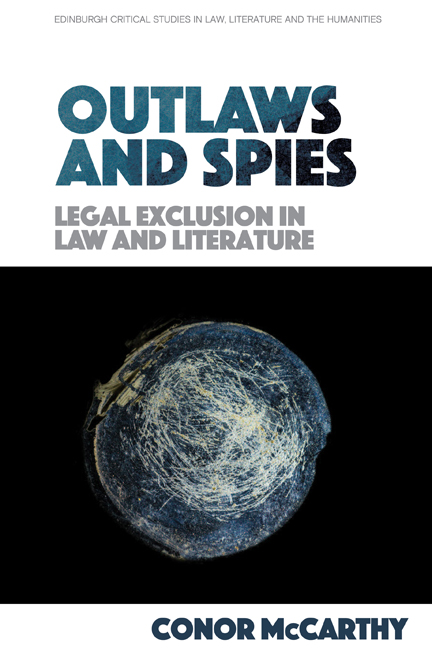Book contents
- Frontmatter
- Contents
- Acknowledgements
- Introduction
- 1 Outside the Law in the Middle Ages
- 2 Sovereign Outlaws: Shakespeare’s Second Tetralogy
- 3 The Endurance of Exclusion: Versions of Ned Kelly
- 4 ‘We’re Not Policemen’: Espionage and Law in John le Carré
- 5 ‘All Plots Tend to Move Deathward’: Plots and Consequences in Don DeLillo
- 6 Unanswered Questions: Ciaran Carson
- 7 Contesting the Virtual: William Gibson
- Conclusion
- Bibliography
- Index
6 - Unanswered Questions: Ciaran Carson
Published online by Cambridge University Press: 08 October 2020
- Frontmatter
- Contents
- Acknowledgements
- Introduction
- 1 Outside the Law in the Middle Ages
- 2 Sovereign Outlaws: Shakespeare’s Second Tetralogy
- 3 The Endurance of Exclusion: Versions of Ned Kelly
- 4 ‘We’re Not Policemen’: Espionage and Law in John le Carré
- 5 ‘All Plots Tend to Move Deathward’: Plots and Consequences in Don DeLillo
- 6 Unanswered Questions: Ciaran Carson
- 7 Contesting the Virtual: William Gibson
- Conclusion
- Bibliography
- Index
Summary
Ciaran Carson was one of a remarkable cohort of Ulster poets whose work coincided with and, inevitably, engaged with the Northern Ireland Troubles, which saw civil conflict erupt in the late 1960s and endure through to the ceasefires of 1994 and the eventual political settlement of 1998. While Carson's complex and diverse body of work is in no way reducible to its engagement with a contemporary political context, both place and political conflict are nonetheless substantive presences in his writing. The discussion here deals with two selections from Carson's writing. It looks first at poems from the 1980s and 1990s that deal with contemporary Belfast, particularly in the collections The Irish for No and Belfast Confetti. It then turns to consider three somewhat interlinked post-Troubles works – the poetry collection For All We Know, and the novels The Pen Friend and Exchange Place – that have visible debts to the literature of espionage. All of these works engage with the Troubles as a subject, emphasising in different ways the uncertainties that emerge from any consideration of the conflict.
These uncertainties stem in part from the extent to which both Northern Ireland itself and some of the participants in the conflict existed and acted outside the normal rule of law. Almost from its inception, the Northern Ireland state operated with additional powers as outlined in the Civil Authorities (Special Powers) Act (Northern Ireland) and its associated regulations, initially introduced as a temporary measure in 1922, but regularly renewed and eventually made permanent. After the suspension of the government of Northern Ireland and the imposition of direct rule from London in 1972, the UK government legislated for emergency powers via the Northern Ireland (Emergency Provisions) Act 1973. These powers were then supplemented by a series of temporary provisions for the prevention of terrorism, beginning with the Prevention of Terrorism (Temporary Provisions) Act 1974. Further to this, various arms of British intelligence also played a substantial role in the conflict: RUC Special Branch, military intelligence, and both MI5 and MI6 (whose extralegal status we have discussed in Chapter 4 above).
- Type
- Chapter
- Information
- Outlaws and SpiesLegal Exclusion in Law and Literature, pp. 159 - 181Publisher: Edinburgh University PressPrint publication year: 2020



